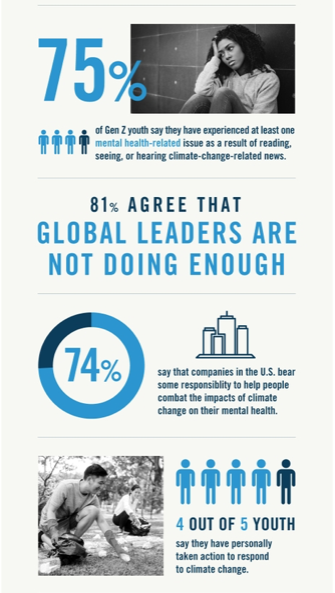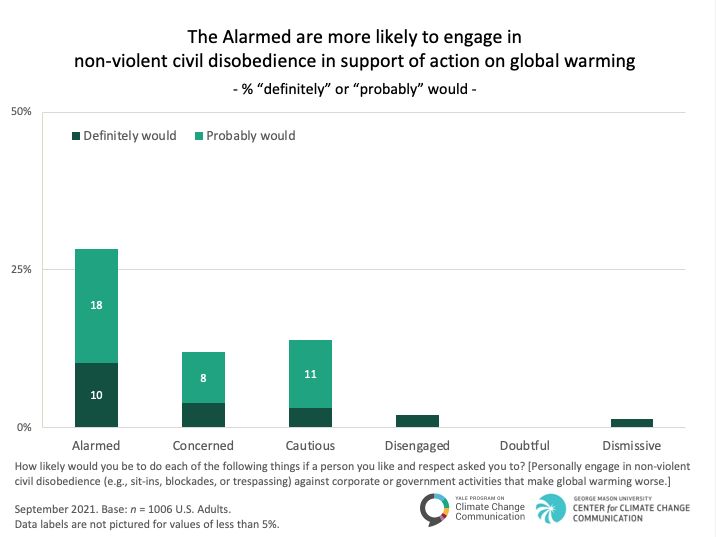Resources
Search below for resources covering the intersection of climate engagement, social science and data analytics.
RESULTS
Poll: Climate change is taking a toll on Gen Z mental health while also inspiring youth to take action
A significant majority of Gen Z youth (75% nationwide, 80% in California) have experienced a mental health-related issue, such as anxiety, stress, and/or feelings of being overwhelmed as a result of reading, seeing, or hearing news about climate change.
- Despite these mental health challenges, four out of five youths (81% nationwide, 86% in California) say they have personally taken action to respond to climate change.
- Young people are stepping up to make a difference by relying less on plastic products (54% nationwide, 64% in California), reducing use of electricity (45% nationwide, 52% in California), and working to conserve water (38% nationwide, 53% in California).
- A vast majority of respondents (81% nationwide, 84% in California) agree that global leaders are not doing enough to combat climate change.
- Three quarters of youth (74% nationwide, 74% in California) say they agree that companies in the U.S. bear some responsibility to help people combat the impacts of climate change on their mental health.
- A majority (85% nationwide, 86% in California) believe it is important to support brands/companies that are sustainable and/or environmentally friendly.
Poll: Americans Report Mental Health Effects of Climate Change, Worry About Future
58% of adults believe climate change is already impacting the health of Americans and nearly half (48%) agree that it’s impacting the mental health of Americans. Half of adults (51%) are anxious about climate change’s impact on future generations.
- Adults are more were worried about the impact of climate change on the planet (55%) than on their mental health (39%). They were split on how news about climate change affected their mood, with 42% saying it affected them some or a lot, and 43% not much or not at all.
- Young people were more anxious about climate change. Of those aged 18-34, 66% were anxious about its effect on the planet, 51% were worried about its impact on their mental health, and 59% worried about its impact on future generations. They were also more likely to believe it was already having an effect on the health (64%) and mental health (57%) of Americans.
- White people were the least likely to report anxiety over the impact of climate change on the planet (52%) versus Hispanics (62%), Black people (65%) or people of other ethnicities (66%). Those in the northeast (57%) and western region (58%) of the country reported being more worried about the effect of climate change on the planet than those in the Midwest (50%) and the South (54%).
Environmental Polling Roundup - April 15th, 2022
This post includes climate and environment headlines, data points, and key takeaways from recent public polls - including new polling on Biden’s climate agenda, voters’ relative trust in the two parties to handle climate change and the environment, voters’ prioritization of climate change relative to other legislative issues in Washington, and a new report of American teens’ attitudes about climate change and the environment.
Poll: Teen Environmental Impact Survey
The environment is a top-of-mind priority for Americans aged 13-19, as overwhelming majorities expect climate change and other environmental issues to impact their lives and shape their life decisions. Nearly nine in ten (89%) say they think about the environment on a regular basis, including 41% who think about it “frequently.” Additionally, more than four in five agree with each of the following statements: “Climate change will impact everyone in my generation through global political instability.” (84% agree); “If we don’t address climate change today, it will be too late for future generations, making some parts of the planet unlivable.” (84% agree); “If we don’t do more to protect the environment today, I expect to make future life decisions based on the state of the environment, including where I live, what kinds of jobs will be available, or if I will have children.” (82% agree). Large majorities believe that they can personally help to address the crisis and want to be part of the solution, with over three-quarters agreeing with each of the following statements: “I would like to be involved in shaping the future of our environment.” (84% agree); “I feel responsible to protect the future of our planet.” (77% agree); “I feel empowered to make a difference in the future of our climate.” (77% agree).
Environmental Polling Roundup - April 1st, 2022
This post includes climate and environment headlines, data points, and key takeaways from recent public polls - including new polling on the energy crisis and gas prices, a new poll of coastal Americans’ attitudes about the climate crisis and policy solutions to address it, new polling on clean energy provisions in President Biden’s economic plan, and a new poll of young voters on President Biden’s approach to climate.
Poll: Young Voters Want Biden to Act on Climate and Fossil Fuel Industry Accountability
Young voters are deeply concerned about climate change and don’t think Biden is doing enough to address it. The poll finds that over three-quarters of young voters aged 18-29 (77%) are “very” or “somewhat” concerned about climate change, including 59% of young Republican voters, but young voters don’t believe that Biden shares their urgency to address the problem. Most young voters (56%), including majorities of young voters of every partisan affiliation, say that Biden is not doing enough to address climate change. Just 20% believe he is doing the “right amount” and only 11% say he is doing “too much” on climate. The poll also finds that proposals for Biden to hold fossil fuel companies more accountable for their pollution, including for the particular harm they’re doing to disadvantaged communities, resonate with young voters: By a 63%-24% margin, young voters support “the Biden administration making oil and gas corporations pay for initiatives to reduce their polluting activities”; By a 61%-26% margin, young voters support “President Biden using his presidential authority to issue regulations to prevent pollution from the fossil fuel industry in low-income communities, communities of color, and other disadvantaged communities.”
Environmental Polling Roundup - March 18th, 2022
This post includes climate and environment headlines, data points, and key takeaways from recent public polls - including new guidance for advocates on how to communicate about rising gas prices and the need to shift away from dependence on oil, new polling on Green New Deal proposals, a comparison of American adults’ climate attitudes to climate scientists’, and new polling of young voters about climate issues.
Youth Concern About Climate Change Drives Civic Engagement
Climate change is a top issue for young people and presents opportunities for broader youth outreach. In 2020, nearly a third of young people named climate change as one of the top three issues that influenced their vote for president. Asian youth and young people in Western states are more likely to say climate change is one of their top issues. Young people who prioritize climate change as a political issue score higher on “civic readiness” than those who do not. CIRCLE’s 2020 pre-election poll of young people ages 18-29 found that 13% of all youth named climate change the top issue that would influence their vote for president—the highest of any issue. After the election, 74% of youth who voted for President Biden said they wanted him to prioritize leading a transition to renewable energy. Climate change is also potentially an important way to reach conservative youth. Among Trump voters, young voters aged 18-29 were more likely than older voters aged 45+ to care about climate change. There are also regional differences: young people in Western states (AK, AZ, CA, CO, HI, ID, MT, NV, NM, OR, UT, WA, WY) were disproportionately more likely to prioritize the environment and climate change as a political issue, which could be due to more direct experiences with droughts, wildfires, and other phenomena exacerbated by climate change.
Poll: Young Americans Still Searching for Real Climate Leadership
Young Americans have mixed-to-negative attitudes about both President Biden and congressional Republicans’ handling of climate change. Air and water pollution and wildlife extinction are young Americans’ top climate concerns. This new poll of Americans aged 18-30, conducted by the conservative-leaning American Conservation Coalition, finds that young Americans are frustrated with how both parties are handling climate change. Climate and the environment are clearly top priorities for young Americans, as majorities say that climate change (55%) and environmental protection (53%) are “very” important to them in deciding who to vote for - putting these issues on par with, or higher than, any other issue priority aside from jobs and the economy (65%) and healthcare (64%). And when younger Americans are asked to rate how political leaders are handling the issue of climate change, both President Biden (39% approve / 44% disapprove) and Republicans in Congress (30% approve / 50% disapprove) are underwater. The poll reveals significant dissatisfaction among young partisans toward their own parties’ leaders, as nearly one-third of Democratic-leaning respondents disapprove of Biden’s handling of climate change (57% approve / 32% disapprove) and over one-third of Republican-leaning respondents disapprove of congressional Republicans’ handling of climate change (47% approve / 35% disapprove). Young Americans are also unsure whether Republicans in Congress even care about climate change, with 39% saying that congressional Republicans care about the issue and 41% saying they don’t. However, young Republicans overwhelmingly agree (71% agree / 22% disagree) that climate change is an issue that Republicans in Congress should care about.
Poll: Who is willing to participate in non-violent civil disobedience for the climate?
A recent survey that asked Americans about their willingness to "support an organization engaging in non-violent civil disobedience against corporate or government activities that make global warming worse" and about their willingness to "personally engage in such non-violent civil disobedience themselves" found:
- Among the Six Americas segments, the Alarmed are the most likely to support an organization engaging in non-violent civil disobedience; half (50%) said they “definitely” (21%) or “probably” (29%) would support such an organization.
- 28% of the Alarmed said they “definitely” (10%) or “probably” (18%) would personally engage in non-violent civil disobedience against corporate or government activities that make global warming worse, if asked to by a person they liked and respected. The ten percent of the Alarmed who are “definitely willing” to personally engage in non-violent civil disobedience represents approximately 8.6 million American adults.
- Millennial and younger adults are more likely to support organizations engaging in non-violent civil disobedience than older generations -- with 35% stating they “definitely would” (14%) or “probably would” (21%) support them -- and also more likely to say they would personally engage in non-violent civil disobedience to protect the climate; 8% said they “definitely would” and 12% said they “probably would,” if asked to by a person they liked and respected.
- People of color are more likely than whites to support organizations engaging in non-violent civil disobedience. About one third (34%) of Black Americans “definitely would” (12%) or “probably would” (22%), and about one third (35%) of Hispanics/Latinos “definitely would” (14%) or “probably would” (21%) support such organizations.
- People of color are also more likely than whites to say they would personally engage in non-violent civil disobedience in defense of the climate; about one in six Hispanics/Latinos (6% “definitely would” and 11% “probably would”) and one in five Black Americans (5% “definitely would” and 17% “probably would”) say they would engage in such actions, if asked to by a person they liked and respected.
Pagination
- Previous page
- Page 4
- Next page




